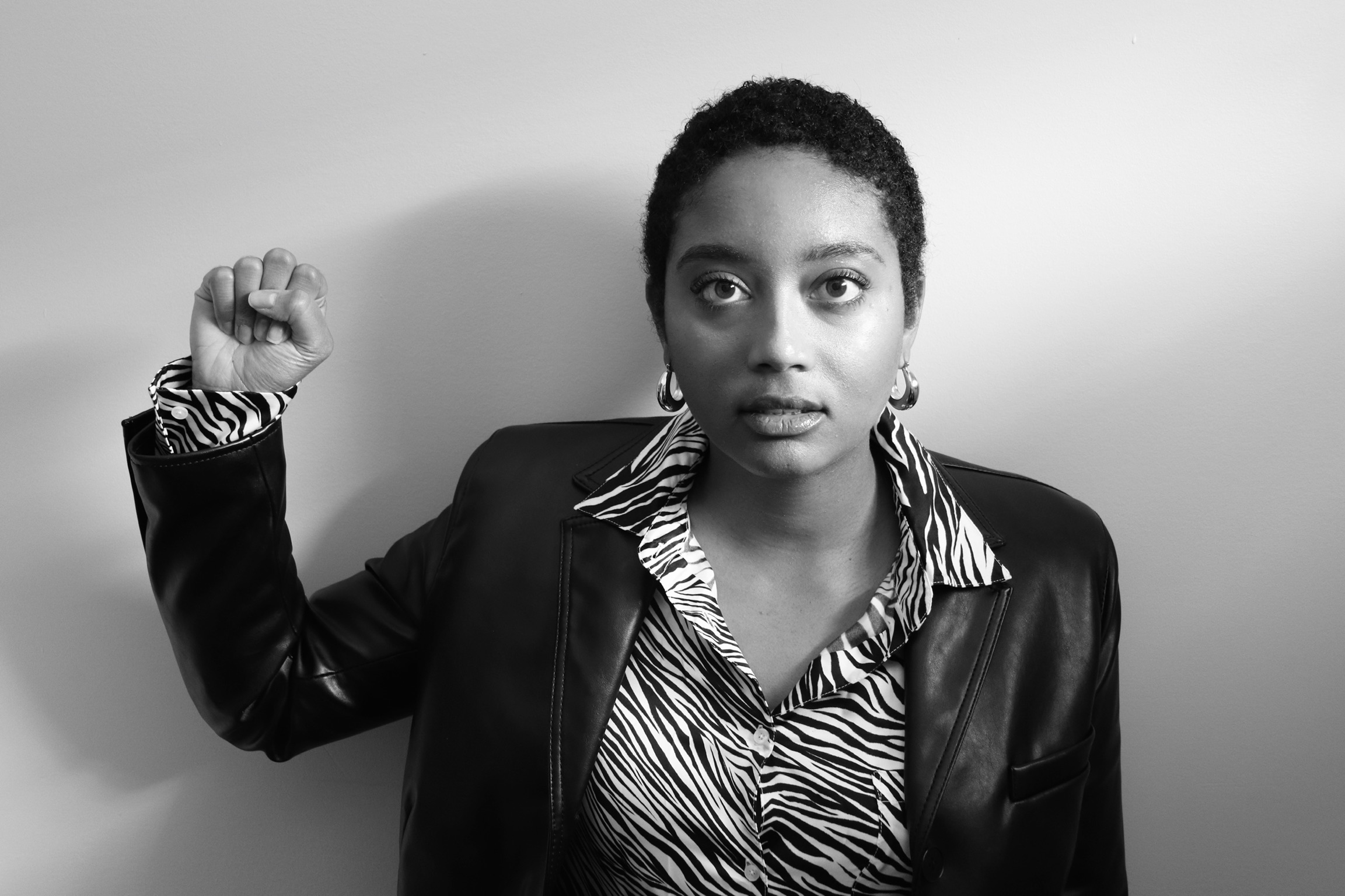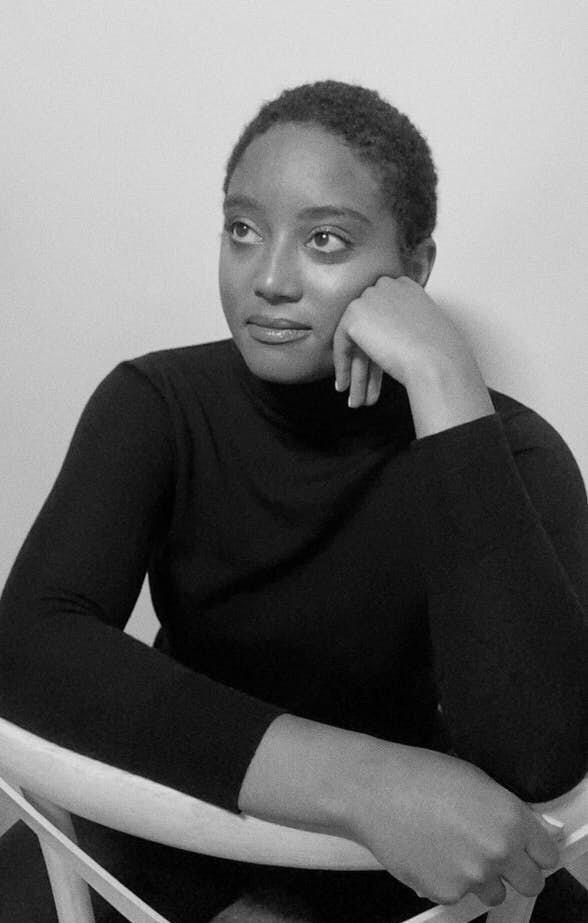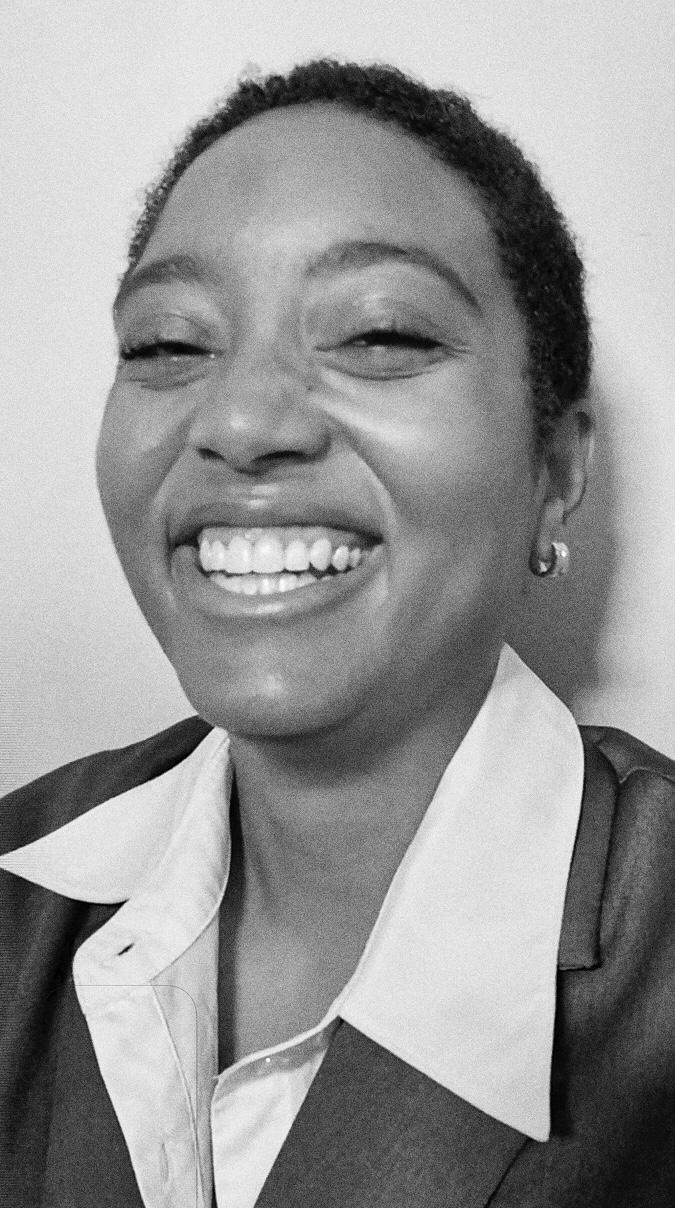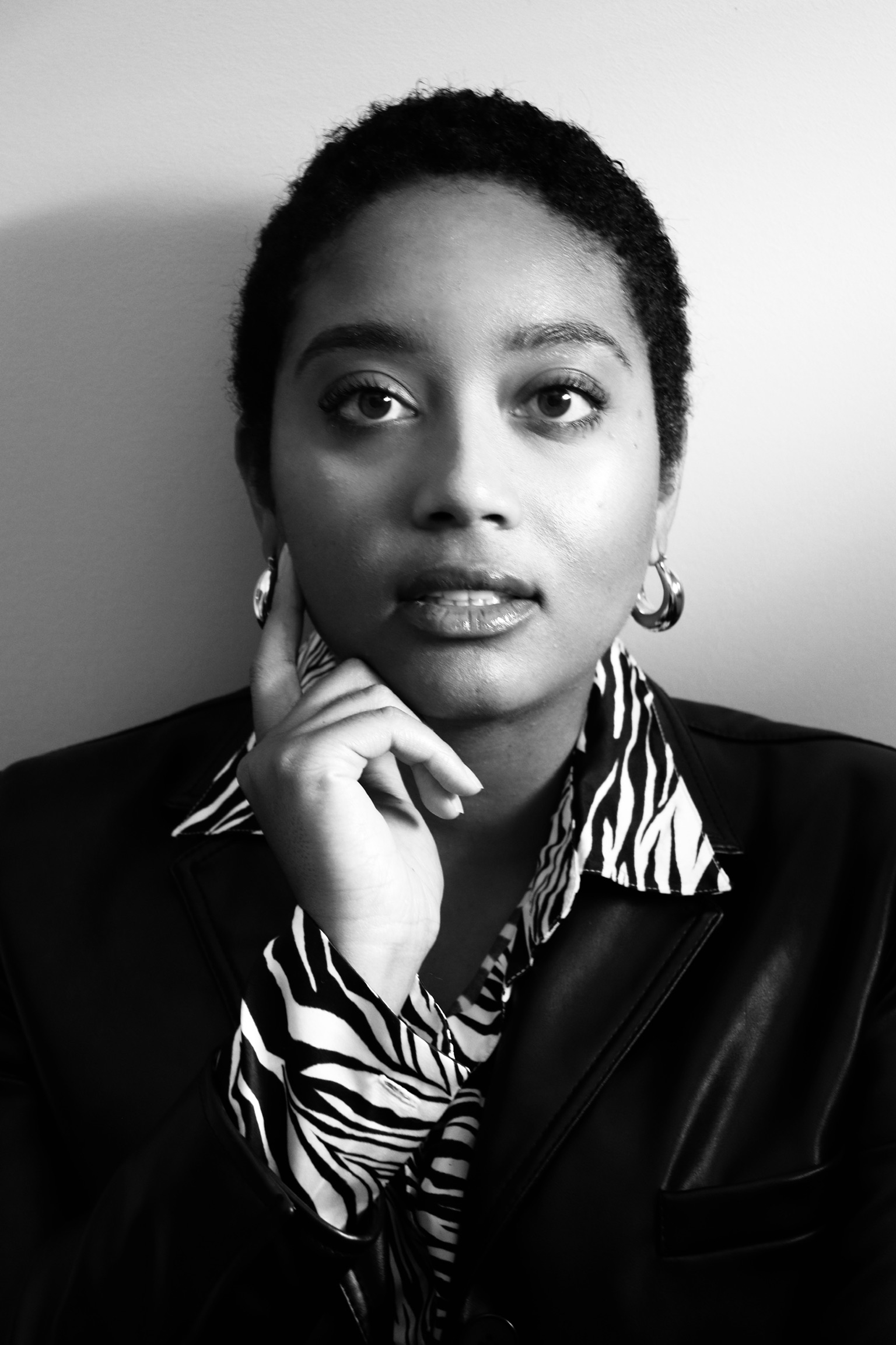Activist Chloe B. McKenzie on How Financial Education Changes Everything
V chatted with the researcher and educator about the intricacies of financial oppression on BIPOC people, the crossover of art and knowledge, and GameStop.

Financial shame, trauma, and abuse are just some of the transforming words Chloe B. McKenzie hopes will soon become part of our society’s daily vocabulary on a path to economic justice and equity. “The first step in healing from financial trauma and fixing our woefully screwed up economic system is to get people to name what they’re experiencing,” she told V in an exclusive interview. “If we don’t name the experience, then ultimately we internalize it. It becomes embodied and we just tend to normalize the violence.”
Language is only the first step. A former Wall Street broker, the activist, researcher, and educator works to make financial education more accessible to underprivileged groups, but especially women of color. Her non-profit organization, BlackFem, teaches young girls across the country how to positively understand and handle money, while her 2020 book, “The Activist Investor,” which she made available for free on her website, is a straightforward manual on how to change historically oppressive systems through investing.
McKenzie’s work was inspired by her own experiences growing up in Prince George’s County, Maryland, one of the wealthiest Black communities in the country. “I had this incredibly unique financial experience growing up where, when my other classmates were being racist towards us, our immediate retort would be to almost ‘financially shame’ the other person,” she said. “Very, very wrong and messed up, but we seemed to have the shields to be able to respond to the oppression that we experienced.” At the same time, she credits a certain feeling of impostor syndrome and insecurity to growing up in an abusive household. “Where does that come from?”
Dressed in a black turtleneck sweater paired up with golden hoop earrings, with both the look and the energy reminiscent of the 1970s Black Panthers, McKenzie spoke with V about financial activism as an art form and how it can be crucial in breaking systemic cycles of injustice.

You are called a “financial artist” – what is the idea behind that?
I see research as an art form. I believe that research needs to be creative because if we really are going to try to create systemic change we have to reconceptualize, reframe and reconfigure the way we think about the world. I feel as though my work is at the intersection of finance, education, academic research, and the performing and visual arts. I like to always visualize some of the things that I’m talking about, so when I try to paint a picture, literally, of what financial trauma looks like or what financial abuse looks like, I ultimately want people to be able to see it because if we can see it, then we can name it and that’s the first step to change.
Financial trauma, shame, and abuse are some of the terms that you often use. How do you explain these concepts?
I wanted to explore to what extent our past experiences, our past traumas, historical trauma on a systemic level, and the internalized oppression that lives within our bodies and therefore is embodied in our financial behavior — to what extent does that have a bigger influence on our wealth-building capability. I ended up coming up with the term “financial trauma” to really kind of capture the multi-layered texture of why we still have contentious relationships with money, as we’re navigating a system that wasn’t really built for anybody except for cisgender white men.
How does financial trauma affect the way a person builds wealth?
I think we have no language to talk about what wealth really is. We tend to want to focus so much on quantity. Wealth to me is not a number. In America, we use wealth as the indicator of who gets to decide to systematically offer or systematically deny who gets to feel safe, who gets to belong, and who gets to experience having dignity. And I think that those three things – safety, belonging, and dignity – are kind of the foundational elements of well-being and what wealth does in this country. How often do we as a person, as a community, as a nation, how often do we feel it’s expected or required of us to experience trauma, abuse, violence, or shame, in order to feel safe? That’s financial trauma and it’s incredibly pervasive. And it’s more pervasive between people who have intersectional identities.

How do you think financial education can empower people, especially women, of color?
Education should do two things: it should help people navigate the oppressive system to try to reduce the effect of the oppression as much as possible while the system is changing, and then it should teach people how to intervene in that system to create that change. If we’re not actually capturing the unique struggle against wealth inequality that Black women experience, Hispanic women, Asian women, to transgender and gender-nonconforming people, then we’re just essentially only making narratives available to people who are privileged, who are often white, and who often don’t have these unique struggles against oppressive systems. And if we’re not talking about the traumas, the experiences, the kind of feelings, the abuses, the shame – if we’re not healing from that, we’re really not going to see a huge shift in wealth-building capability. Then we’re [just] perpetuating the system.
You mentioned a “language for wealth” and that’s something that comes up in The Activist Investor as well. In that book, you also use very familiar jokes and expressions – why do you think it is important to make financial education accessible to people, starting with your work at BlackFem?
I’ll use this example: we have this larger movement about reaching pay parity, which is important. But I don’t feel as though we’re naming it as bluntly as we could to make the people who are responsible for the abuse feel guilty. What would it mean to go to one of your bosses who’s responsible for your salary and saying, “You know, it’s not just unfair that I’m getting paid differently than others. It’s actually abusive.” What would it mean to tell our policymakers they are perpetrating financial abuse through their policies, and to essentially shift the blame and the shame, and the responsibility of the abuse back onto the abuser. So that’s part of the reason I’m making things accessible, it’s so important because we then get to adopt the lexicon in a way that is authentic to ourselves so that people can actually then start healing for themselves and their community.
In “The Activist Investor” you say you are repurposing and reclaiming a term created by men. What does it mean to be an activist investor today?
For me, reclaiming this really was this very creative and ambitious idea of saying, “Well, you know, if every woman of color bought one share in a company…” There are millions of us. We are the majority in the country, we would have a controlling interest in that company. It is that simple, knowing that there’s a lot of other complicated things that need to happen until then.
So there’s kind of this two-pronged approach that I took in the book. One is, let’s teach people how to trade stocks because nobody really knows, that’s the “How-to” side. How do you trade stocks, and then how do you intervene in it, how do I leverage my rights as a shareholder, to create institutional change that, hopefully, would then create a huge political shift about who gets to belong, who gets to feel safe, and who gets to feel dignified.

We recently had this situation where Reddit users got together to buy GameStop shares – could they be considered activist investors?
What I thought was really awesome about what’s going on in this Reddit chain is the idea that we’re starting to now see that if the designers of this economic system, which is rife with financial abuse and perpetrates financial trauma so frequently, created this rule that says, well, corporations’ main objective is to maximize shareholder wealth – then I see that as a tip or a guidepost to say, we need to become shareholders so that people will listen to us.
We are actually brokering our own power when we enter into the financial markets and we know how to use the financial markets against the oppressors. And that’s what’s happening here. So absolutely, I think what’s going on with the GameStop situation is a form of activist investing. Because now we’ve exposed how fragile the system is in the first place. And isn’t that what systemic change is all about?
What lessons can we take from this form of activist investing?
I think the biggest lesson that we can take from this is that even in the midst of intense oppression, and in the ways that our systems are designed to make things difficult for us, we can still find moments like this. I think there are plenty of entry points for us to be able to build wealth for ourselves but also completely restructure the economic system that is perpetrating such financial and economic violence. And we can continue to expose this for what this is. So I think this is a really great moment that we should continue to talk about. I think it’s beautiful that we get to welcome a new wave of activist investors who aren’t just, you know, wealthy cis-white men.
How has quarantine affected you professionally, both as a financial researcher and at BlackFem, and personally?
I think the big thing is that financial trauma has gotten even worse since COVID happened. If there’s one thing I could wish for, is that financial trauma, financial abuse, and financial shame become a part of our daily lexicon. If we can start using these terms and shifting the blame back to the people who are actually responsible for it, we’re going to see major shifts. That’s kind of what my main focus of COVID has been, it’s just getting people to realize none of this is our fault. But what we are experiencing is very traumatic and is being embodied in our financial behavior.
Discover More
